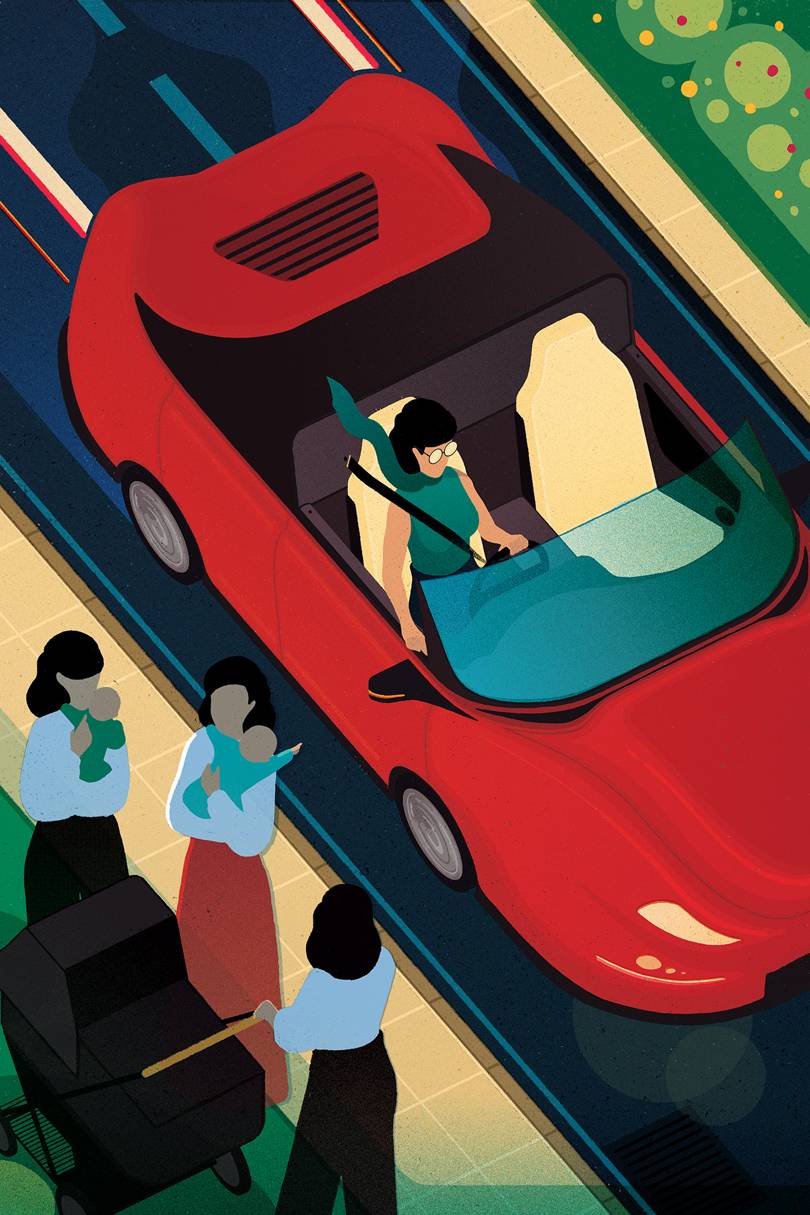Not All Women Want To Be Mothers: The Stigma That Surrounds Choosing Not To Have Children
- Home
- Not All Women Want To Be Mothers: The Stigma That Surrounds Choosing Not To Have Children

Not All Women Want To Be Mothers: The Stigma That Surrounds Choosing Not To Have Children
Birth rates around the world are going down as maternal ambivalence climbs. So why do women who have happily chosen childlessness still feel judged? Dr Peggy Drexler, a New York-based research psychologist who has written books on gender and family, explores the ongoing stigma.
Ginia waited years for maternal instinct to kick in. Surely, she thought, it must. But while the San Francisco native liked kids well enough, she never felt that urge to have any of her own – even after she met the man she would go on to marry; even as her friends began to have babies of their own. Now 42, she’s entering her final childbearing years, and while there are days she toys with the worry of having future regrets, she’s also fairly happy, she says, to simply let the clock run out.
“If I’d been a person who saw a baby and wanted to ‘eat it up’ – you know how you hear women talking this way, like the baby is a cupcake – maybe I’d have done it and never thought twice,” says Ginia, who asked that her name be changed for reasons of privacy. “But at a certain point, and in the absence of that sort of reaction, I just wasn’t sure I wanted to give up the life that being childless had afforded me: frequent travel, nice clothes, Sunday mornings sleeping in.” Her friends talked about husbands who didn’t share enough of the workload, resentments clearly building; her own marriage was pretty solid and she wanted to keep it that way. “I like kids,” she says, “but they’re a lot – and they’re permanent.”

Ginia may be the only one of her friends without children, but she’s certainly not alone. Birth rates around the world are going down as maternal ambivalence climbs. The 2017 Global Burden of Disease Study reported that the global fertility rate has been cut in half since 1950, while an analysis of 33 studies of fertility intentions in developed countries found that roughly a fifth to a third of women who become pregnant aren’t sure whether or not they actually want a baby. The US birth rate is at an all-time low. So is South Korea’s, where last year it fell to less than one child per woman for the first time ever. And earlier this month, the Financial Times reported that the number of new births in China dropped for the second consecutive year since the country repealed its one child policy.
The reasons women are giving are varied. Having babies is expensive for one thing: a 2017 USDA report found that American parents spend, on average, more than $230,000 on child costs from birth to age 17, not including college. They’re bad for the planet, too. Science has long stated that having a child is pretty much the worst thing you can do for the environment; one study out of Sweden found that having one fewer child per family can save nearly 60 tons of carbon-equivalent emissions a year. The increase in working women — and female breadwinners — around the world has also left many reluctant to leave jobs that aren’t always guaranteed to be there when they return.
And yet, plenty of women simply don’t want to have children for what others might view as less, let’s say, practical reasons. “My friends would describe me as easily the most suited for motherhood,” says 29-year-old, London-based artist Lotte Andersen. “I don’t find stuff gross and I’m extremely good at being responsible. My mother died when I was young and I took care of my siblings, and I constantly mother my girlfriends. But I do exactly what I want. I have sex with men and women. I’m free in so many ways that I feel are very important and essential to who I am.” She’s calling from Lima, where she’s doing an artist’s residency. She’s passionate about her work, she’s hustled to get where she is — and there are still places she wants to go. “It sounds selfish, I hate saying it, but I feel like I need to be efficient right now,” she says. “Since I was little, it’s troubled me that I’d have to give away eight to 10 years, at least, if I had a baby. My work is my child.” Yet while she feels empowered in her decision, and in her life otherwise, she also can’t help but feel judged.
Which, in truth, she probably is. Even as more women are choosing not to have children — and the idea that there’s many different ways to create a “family” has become more normalised — there still exists a stigma surrounding women who don’t bow down to, or perhaps even feel, a maternal urge. Women who opt out feel somehow “threatening”, as Andersen puts it. They defy our expectations of what women do or “should” want.
“Many people think that women who don’t want kids don’t like kids, which is almost never the case,” says psychologist Dr Sarah Gundle, co-clinical director at Manhattan behavioural health studio Octave. “Liking kids or not is rarely the reason I see among patients who’ve decided to remain childless. Women now have more choices, and for many, it’s a choice like any other choice. But the idea of women [having children] is still so deeply ingrained in our collective consciousness that women who choose not to are often seen as a little suspect.”

Or worse than a little. A 2017 study published in the journal Sex Roles found that many people consider the decision to forgo parenthood as not only abnormal, but also morally wrong. “Voluntarily child-free people elicited moral outrage — anger, disgust, disappointment — relative to people with children,” says study author Dr Leslie Ashburn-Nardo. “They were also seen as less psychologically fulfilled.” In other words, she says, most of us expect voluntarily child-free people to live “incomplete” and “unhappy” lives. In a piece on Chinese online magazine Sixth Tone, Fan Yiying writes of the open Chinese disdain for couples who choose not to have kids; even the marriage counsellor quoted in the piece “advises her clients to have children, calling parenthood ‘an indispensable life experience’ and arguing that it doesn’t have to preclude work and other life goals”.
The irony, as Dr Gundle points out, is that having children does not actually make people happier. A 2016 study published in the American Journal of Sociology looked at families in 22 countries and found that having children makes people significantly less happy compared to people who don’t have kids, a phenomenon researchers dubbed the “parenting happiness gap”. Nevertheless, says Dr Ashburn-Nardo, “As a society, we tend to assume [having children is] more than just what most people do, it’s what they should do. It could potentially be effective for a voluntarily child-free woman to deflect bias by providing a reason,” she continues, “but this alone isn’t very fair – we don’t tend to ask parents why they chose to have kids, so why would we want to question non-parents’ motives?”
It could be, perhaps, because some parents question their own motives. Dr Gundle says that she sees many patients who have mixed emotions about children after they’ve already had them, often a reaction to the pressure on women, and mothers in particular, to be perfect, to take on too much and to always prioritise their kids. “Maternal ambivalence is common, but very rarely talked about because it’s often linked with shame,” says Dr Gundle. “But the passion these days to raise children ‘correctly’ ends up burdening contemporary parents to an alarming degree.”
Andersen, for her part, thinks her decision to opt out is one of the more responsible, and least selfish, she’s made. “I love plenty of things more than me,” she says. “I just think, I’m at the top, I’m totally educated, privileged, why not on earth take that privilege seriously? If I can travel to Peru and make the art I want to make, that’s a better use of my time than breastfeeding. I just wish more girls knew this was an option. I think they need to see women who decide to do other things — one day it’ll be, ‘Auntie Lotte had a wonderful life.’”
Dr Peggy Drexler is a New York-based research psychologist and filmmaker. She is the author of two books about gender and the family, and her next book will focus on the culture of female competition; peggydrexler.com
Source: vogue.co.uk
- Share
Classic Ghana
Classic Ghana brings you into a fun world of arts, entertainment, fashion, beauty, photography, culture and all things in between. Let’s explore these together!







